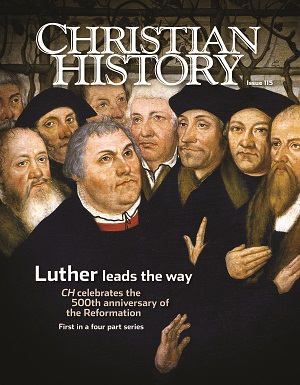Our Luther issue is now available!
Now available: the first issue in our series of four celebrating the 500th anniversary of the Reformation
We’re pleased to annouce that the first issue is now out in our four-issue series leading up to the celebration in 2017 of the Reformation’s 500th anniversary. You can read it online here, where you can also purchase single copies or bulk orders for Sunday School classes, church study groups, college and seminary classes at generous quantity discounts. For quantities over 100, contact dawn for more details!
We begin in this issue with the story of Luther. Actually, we start with the story before Luther: a number of people throughout the later Middle Ages who began to feel that the church had somehow gotten off course and that it needed reform. Then we explore how Luther’s movement caught fire and how it quickly resulted in something no previous reform effort had—large-scale division of the Western church.
We’re pleased to be able to reprint in this issue several classic articles from Christian History’s two previous issues on Luther (34 and 39) and from issue 49 on everyday faith in the Middle Ages, all updated with new images. But we also take a fresh look at who Luther was; who helped him and who opposed him; what he changed and what he didn’t. New authors include David C. Steinmetz, David Fink, Edwin Woodruff Tait, and Beth Kreitzer, and we have “oldies but goodies” from James Kittleson, Lewis Spitz, Timothy George, and Mark Edwards.
The second issue in this series, in mid 2016, will talk about people who took a Reformation message into the political realm, from Zwingli, to the Anabaptists, to the Peasants’ Revolt. We’ll follow that with an issue in late 2016 about what happened when all the fluid divisions and changing allegiances of the movement’s early years began to harden and solidify into separate “confessions,” with an emphasis on Calvin and the confessions he influenced as well as how the British took things in a different direction. Divisions hardened politically, too, as cities and nation-states declared allegiance to the Catholic or Protestant side. Finally, in 2017 itself we’ll complete our series with an issue on the Catholic Reformation (sometimes called the “Counter-Reformation”), which grew out of the Catholic response to these new Protestant movements.
We hope you’ll join us for this detailed and exciting journey. No matter what part of the church you come from, I hope you’ll remember our common beginnings and our common faith as we realize our bonds, both past and present, with all of our brothers and sisters in Christ.




